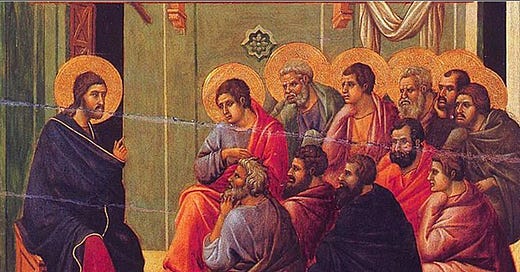The Benefits of Leaving
A sermon from Jesus's farewell discourse with a cameo from Patrick Ewing.
In John 14-16, Jesus prepares his disciples for life without his ongoing physical presence in the world.
He's preparing them for, what is for us, an everyday reality. We have only known life in this world after Jesus's ascension into heaven. So his message to his original disciples about how to not only survive, but also thrive while he's away is just as relevant now as it was then.
So far we've seen how Jesus comforts us by assuring us of his ongoing presence through the Holy Spirit, who lives within and walks alongside us.
He also lays out what is to be our number one priority while he's away. We're to abide in his love by loving one another as he has loved us. This ensures we produce the kind of fruit that glorifies God and identifies us as true disciples of Christ.
Today, we're going to unpack another big idea in Jesus's farewell message: How Jesus's departure works to our advantage and is for our benefit.
If Jesus Stayed
Before we consider the advantages of Jesus leaving, let's first do a little thought experiment and imagine what would have happened if Jesus had stayed.
Have you ever thought about how the ongoing physical presence of the resurrected Christ would have complicated an already complex world?
Where would the resurrected Christ have set up his headquarters?
Jerusalem?
Rome?
Abilene?
Let's go with Jerusalem.
If you had been one of Jesus's first disciples, how would his ongoing physical presence alter the trajectory of your life?
Would you have been more or less likely to leave Jerusalem if the resurrected Jesus lived there?
As it was, it took an outbreak of persecution to scatter the early disciples into the world after Jesus's ascension and the coming of the Spirit at Pentecost.
Their inclination was to remain in Jerusalem where they could enjoy this new way of life God was birthing among them.
How much more so if Jesus had used Jerusalem as his home base?
Can you imagine how many people would flock to Jerusalem to see and touch and talk to the risen Lord?
How large would the crowds asking Jesus to solve their problems or resolve their conflicts or fix their broken lives be?
The traffic in Jerusalem would be a nightmare.
Why He Left
As much as his disciples want Jesus to stay with them, he knows it is for their benefit and for the benefit of the world for him to leave.
“Nevertheless I tell you the truth: it is to your advantage that I go away, for if I do not go away, the Advocate will not come to you; but if I go, I will send him to you.” (John 16:7, NRSV)
Why Jesus has to go away for the Spirit to come is above my pay grade, but the practical implications of this metaphysical mystery are easy enough to see.
When the Logos/Word of God became flesh in Jesus of Nazareth, God took on the limitations of time and space.
Jesus could only be in one place at a time.
Jesus's ministry was limited to a small geographic area in and around Jerusalem and Galilee.
Only a few people had access to him.
He couldn't get to everyone who needed him. Everyone who needed him couldn't get to him.
But through the presence and power of the Holy Spirit, the risen Christ is now available and accessible to everyone everywhere.
Remember Jesus's conversation in John 4 with the Samaritan woman who wants to know upon which mountain God is to be worshipped.
Jesus says a time is coming when people will not go to a specific place to worship God, but rather God, who is Spirit, will be present to all worshippers everywhere.
When Jesus leaves, the Spirit of truth comes and opens our eyes to see all of creation as an appropriate place to worship God.
To this end, it's the Spirit who goes with and empowers Jesus disciples on their mission to awaken worshippers around the world.
“And when he comes, he will prove the world wrong about sin and righteousness and judgment: about sin, because they do not believe in me; about righteousness, because I am going to the Father and you will see me no longer; about judgment, because the ruler of this world has been condemned.” (John 16:8–11, NRSV)
Just as Jesus told Nicodemus in John 3 that one must be born from above or by the power of the Spirit, he also tells his disciples it is the Spirit who convicts the world of the sin of unbelief and reveals the truth of the Gospel
It's not our job to change minds or hearts or to convict others of their sin or convince them of the truth about Jesus. The Spirit does this.
It is to our advantage that Jesus goes away so that the Spirit can come and empower our mission in the world by validating the message of the gospel in the hearts of those who receive it.
We see this advantage in the way the Spirit makes the first disciples more effective and productive in Jesus's absence, than they ever were when they were with Jesus.
It's one of the stunning turnarounds in history.
How did the mumbling, stumbling, fumbling disciples described in the gospels go on to lead a movement from the houses of Jerusalem to the halls of power in Rome and then to the ends of the earth, while creating and shaping the core values of western Civilization along the way? It happened...because Jesus left.
The Ewing Theory
It's the gospel version of the Ewing Theory. The Ewing Theory was made popular yeas ago by sportswriter and podcaster Bill Simmons. The Ewing theory holds that teams sometimes play better without their star player, which the New York Knicks seemed to do when their star, Patrick Ewing, was injured or on the bench in foul trouble.
Another famous example of the Ewing theory is the University of Tennessee wining the national championship the year after superstar Peyton Manning graduated and moved on to the NFL.
A more recent example is when the Washington Nationals won the World Series after losing superstar Bryce Harper to free agency.
One of the explanations for the Ewing theory is that when the star is in the game, it's easier for others to step back and allow the start to do all the important work. But when the star leaves the game or the team, it forces the others to step up, take responsibility, and pull together as a group.
Is Jesus espousing an ancient version of the Ewing Theory when he says:
“Very truly, I tell you, the one who believes in me will also do the works that I do and, in fact, will do greater works than these, because I am going to the Father.” (John 14:12, NRSV)
If by greater, Jesus means doing something more impressive than turning water into wine or feeding thousands with a little bit of bread or raising someone from the dead, then it’s hard for me to see how this is possible.
But if by greater, Jesus means taking the gospel to the nations, then the scope of the disciples' global ministry is indeed greater than Jesus's local ministry when he walked the earth.
Creating Space
When Jesus leaves his disciples, he's not abandoning him, he's giving them the opportunity to put what they learned from him into practice, with the aid of the Holy Spirit.
By leaving, he's creating space for his disciples to grow up.
Jesus will not be there to protect them from trouble. He won't be there to give them a definitive answer to their every question. He won't be there to solve their problems or resolve their conflicts.
They'll have to learn how to listen to and trust the Holy Sprit when they're not sure what to do next. They'll have to learn from their mistakes and failures and exercise wisdom to solve problems and overcome obstacles.
They'll have to learn to speak and live the truth and trust the Spirit to do the convincing and convicting.
They do learn all of this and so much more because Jesus leaves.
There's also, it seems, some wisdom for us to be gleaned from Jesus's example.
Sometimes the best thing we can do as parents, coaches, ministers, elders, leaders, supervisors, and executives is to "leave" those who are in danger of becoming too dependent on our care, protection, and direction.
By leave, I don't mean abandon, I mean we withdraw or step away for the purpose of giving those under our care the space to learn and grow and take responsibility.
So maybe there's a word of wisdom here for overprotective helicopter parents who are troubled by their children's perpetual immaturity.
Maybe there's a word of wisdom here for micro-managing supervisors who lament their direct reports' inability to solve problems on their own.
Certainly there's a word of wisdom here for those of us who have a role in the growth and formation of others into Christ-likeness.
There is a time to leave, to withdraw, to step away, to make room for the Spirit to do in others what we cannot do for them ourselves.
After Jesus's resurrection and before his ascension, he appears to his disciples and says:
“Peace be with you. As the Father has sent me, so I send you.” When he had said this, he breathed on them and said to them, “Receive the Holy Spirit.” (John 20:21–22, NRSV)
May the Holy Spirit, the breath of God, breathe new life into us and fill us with comfort, courage, truth, and wisdom as Christ sends us on our mission into the world.
May the Holy Spirit, the breath of God, convict and convince and breathe new life into those with whom we share the good news of Jesus Christ.
May the Holy Spirit, the breath of God, empower us to do even greater things while our risen, ascended Lord is away.






Wow Wade, that was just ...wow. Leaving is not a bad thing......what a beautiful sentiment. A paradigm shift, for me, for sure. You had such an impact on my life. Thank you. I love rolling with the good good Papa, moment by moment; and all His children, that He puts in my path. Praises and blessings
Great post, Wade. Thank you for sharing. Under your last category I was reminded of the boundaries set for Levitical service after age 50:
“|25| “But at the age of fifty years they shall retire from service in the work and not work any more. |26| “They may, however, assist their brothers in the tent of meeting, to keep an obligation, but they themselves shall do no work. Thus you shall deal with the Levites concerning their obligations.”” (Numbers 8:25–26 NAS95)
It seems to me that God was making a sure space to allow others to get the experience they needed to continue passing on that experience of particular works which was to be required from generation to generation in accordance with that covenant. This brings all sorts of relevance to mind in considering Christ's church today and our responsibilities in passing on the knowledge and application of the faith to the generations coming up behind us. Not in a direct one-for-one way as if we should have Christians shut out from service at 50 (age seems to be of particular value for certain works in the church), but in the reminder of what that work must remember it entails as its central purpose – preparing the next people to pass the faith on to the ones we will never see!